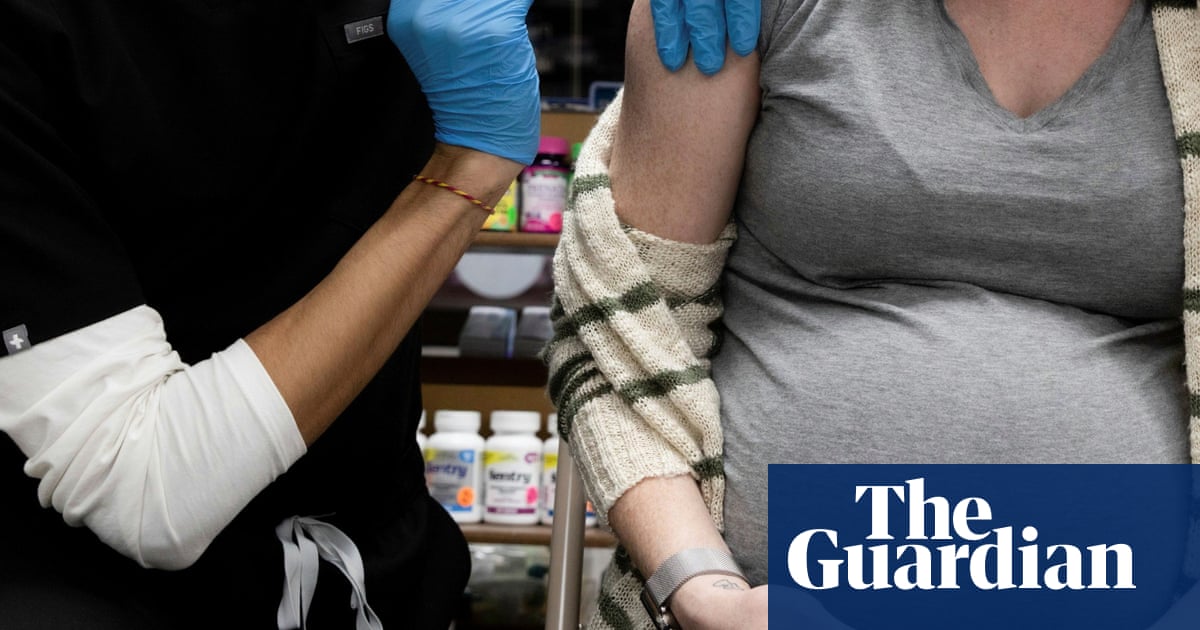The US health secretary,Robert F Kennedy Jr, announced that the federal Centers for Disease Control and Prevention (CDC) would remove Covid-19 booster shots from its recommended immunization schedule for healthy children and pregnant women.
Legal experts said theTrump administrationappointee’s decision, which Kennedy announced onsocial media, circumvented the CDC’s authority to recommend such changes – and that it is unprecedented for a health secretary to unilaterally make such a decision.
“I couldn’t be more pleased to announce that as of today, the Covid vaccine shot for healthy children and healthy pregnant women has been removed from the CDC’s recommended immunization schedule,” Kennedy said in the announcement.
Kennedy claimed Joe Biden’s administration last year “urged healthy children to get yet another Covid shot despite the lack of any clinical data to support the repeat booster strategy in children”.
The secretary was flanked by Food and Drug Administration (FDA) commissioner – Dr Marty Makary – and the head of the National Institutes of Health (NIH), Dr Jay Bhattacharya. Neither the head of the FDA nor of the NIH would typically be involved in making vaccine administration recommendations.
Bhattacharya said the announcement was “common sense and good science”.
Removing the booster shot from the recommended immunization schedule could make it more difficult to access – and it could affect private insurers’ willingness to cover the vaccine. About half of Americans receive healthcare through a private insurance company.
Such a unilateral change is highly unusual if not unprecedented for a typical US Department of Health and Human Services (HHS) secretary. And it could leave the HHS department open to litigation, said one vaccine law expert.
“The secretary has never been involved in making Covid-19 vaccine recommendations – any vaccine recommendations,” said Dorit Reiss, a law professor at the University of California San Francisco who has closely followed attempts to circumscribe access to Covid-19 vaccines.
It is not clear whether the social media announcement was accompanied by formal documentation of the change. Annual Covid-19 booster shots were stillrecommendedfor children on the CDC’s website Tuesday morning. It is unclear how Tuesday’s announced change could affect federal programs, such asVaccines for Children, which provides shots to uninsured and under-insured children.
“I am surprised at the open contempt they are showing to the process and not even pretend to do it in a substantive and deliberative way,” Reiss said. “If only because I would think they want to make it as litigation-proof as they can.”
Typically, changes to vaccine administration recommendations are first considered by the CDC’s advisory committee on vaccine practices (ACIP), a group of independent vaccine experts. ACIP meetings are public, meaning in a normal process Americans can watch experts debate the validity of different approaches in real time before a vote. Although the CDC does not always take the group’s advice, it often does. The CDC was without a permanent director as of Tuesday, a little more than four months into Donald Trump’s second presidency.
ACIP recommendations are then counter balanced by recommendations from the FDA’s vaccine and related biologics products advisory committee, which has a similar structure and transparency measures. That group met five days earlier to recommend strains to include in this fall’sCovid-19 booster shot, settling on the JN.1 lineage.
Kennedy’s announcement Tuesday comes as the Trump administration has packed HHS with “Covid contrarians” – a colloquial term used by researchers to describe people, typically critics, who do not accept mainstream public health’s recommendations to prevent Covid-19.
Congressional Republicans allied with Trump have alsocontinued to flogthe Biden administration’s response to the pandemic in hearings. Vaccine hesitancy has becomemuch more commonamong Republican party voters than it once was, a Gallup poll has found.
The change comes as Makary and the head of the FDA’s vaccines arm, Dr Vinay Prasad, made asimilarly unprecedentedannouncement in theNew England Journal of Medicineto change Covid-19 booster shot licensing criteria.
